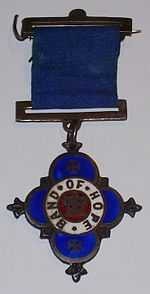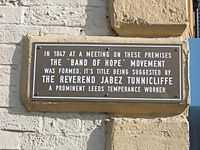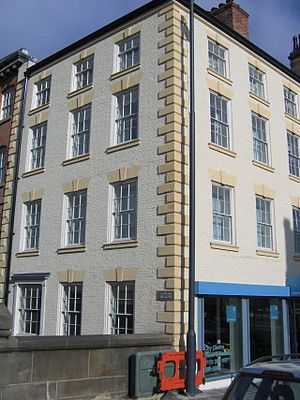Hope UK

Hope UK is a United Kingdom Christian charity based in London, England which educates children and young people about drug and alcohol abuse. It was founded in 1855 as the Band of Hope.
Band of Hope

The Band of Hope was first proposed by Rev. Jabez Tunnicliff, who was a Baptist Minister in Leeds, following the death in June 1847 of a young man whose life was cut short by alcohol.[1] While working in Leeds, Tunnicliff had become an advocate for total abstinence from alcohol. In the autumn of 1847, with the help of other temperance workers, the Band of Hope was founded. Its objective was to teach children the importance and principles of sobriety and teetotalism. In 1855, a national organisation was formed amidst an explosion of Band of Hope work. Meetings were held in churches throughout the UK and included Christian teaching.
Set up in an era when hard liquor was generally viewed as a necessity of life, next only to food and water, the Band of Hope and other temperance organisations fought to counteract the influence of pubs and brewers, with the specific intention of rescuing 'unfortunates' whose lives had been blighted by drink and teach complete abstinence.
Christians and Temperance Societies saw this as a way of providing activities for children that encouraged them to avoid alcohol problems. Alcohol-free premises were established, rallies, marches and demonstrations were mounted to oppose the "evils" of hard liquor that were attended by thousands of supporters, and coffee taverns were established to keep teetotalers on the straight and narrow path.
"Signing the pledge" was one of the innovative features. The pledge was a promise not to drink alcohol and millions of people signed up. There were also lectures that were illustrated by magic lantern, the technological equivalent to present day computerised PowerPoint displays, and noted personalities were invited to speak at public meetings in support of the cause. Guy Aldred, the boy preacher was an active propagandist for the Band of Hope, before focussing his activities on Anarchist-Communist politics.

The movement steadily grew to nearly 3,000,000 members by 1935. By the early 1950s, however, the temperance movement had all but succumbed to a changing society and cultural habits. Lack of support for the Band of Hope eventually brought about their transformation into Hope UK.
Hope UK remains concerned with children's welfare, giving priority to the development of resources and training for parents and children's workers of many kinds. The charity also attempts to persuade churches and other Christian organisations to include drugs awareness work within their programmes and play their part in helping to reduce the UK's alcohol and other drugs problems. Hope UK is a member of The National Council for Voluntary Youth Services (NCVYS).[2]
Prevention
Hope UK’s aim is to prevent the harm related to alcohol, tobacco or illegal drug use.
Hope UK does this by encouraging individuals – especially children and young people – to choose to make healthy choices about using substances. This is called "Primary Prevention" because the aim is to stop drug use before it starts.
The majority of young people are not part of the illegal drug culture, although many more smoke and/or drink. Hope UK’s values lead to a strong emphasis on peer influence and role modelling. What each person does affects those around them. "Significant" adults like parents, children’s and youth leaders have an impact on children as they grow up by what they do and say.
There is debate about the effectiveness of prevention and there are no easy answers. The charity provides a positive education that celebrates life and promotes good health. Activities which help children and young people to improve their decision-making ability and knowledge are also part of the charity's prevention work.
Training
The charity provides training courses across the UK, ranging from short workshops to two-day Open College Network (OCN) accredited courses.
Hope UK’s Drug Educators undergo a 120-hour OCN accredited course to prepare them for leading drug awareness sessions and training courses. This course is also available for those who want to provide drug education as part of their own work.
The charity provides a two-day OCN-accredited "Young People, Drugs and the Role of the Youth Worker" course for people that work with children and young people. It also provides "Drug Prevention for Family Workers", a two-day course for those working in family centres, with parents, or for Children’s or Community Development workers.
Sessions for Church Workers include the application of faith principles to drug issues; Church drug policies and practice; and suggested action by churches for and with their communities. Hope UK’s Church Leaders’ Pack is also available as a paper resource.
See also
References
- ↑ H Marles, The Life and Labours of Rev Jabez Tunnicliff, 1865, pp. 213–210.
- ↑ Full list of NCVYS members
External links
- Hope UK, drug education for children and young people
- The National Council for Voluntary Youth Services (NCVYS)
- Hope UK, Registered Charity no. 1044475 at the Charity Commission